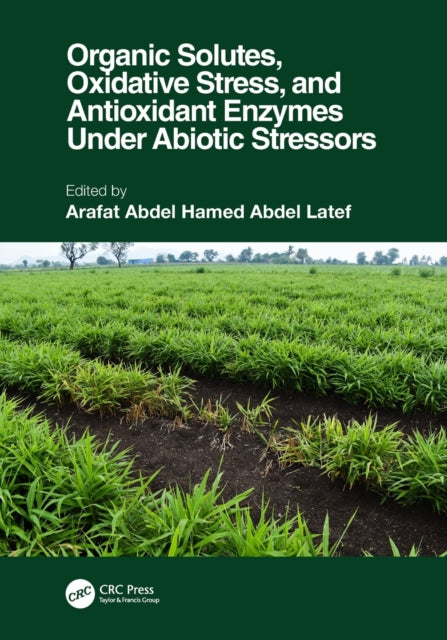Shulph Ink
Organic Solutes, Oxidative Stress, and Antioxidant Enzymes Under Abiotic Stressors
Organic Solutes, Oxidative Stress, and Antioxidant Enzymes Under Abiotic Stressors
YOU SAVE £3.84
- Condition: Brand new
- UK Delivery times: Usually arrives within 2 - 3 working days
- UK Shipping: Fee starts at £2.39. Subject to product weight & dimension
Bulk ordering. Want 15 or more copies? Get a personalised quote and bigger discounts. Learn more about bulk orders.
Couldn't load pickup availability
- More about Organic Solutes, Oxidative Stress, and Antioxidant Enzymes Under Abiotic Stressors
This book provides evidence-based approaches and techniques for diagnosing and managing organic solutes, oxidative stress, and antioxidant enzymes in crop plants under abiotic stressors. It discusses strategies for abiotic stress tolerance, including osmoregulation, osmoprotectants, and the regulation of compatible solutes and antioxidant enzymes. With contributions from 49 scholars worldwide, it is an authoritative guide for scientists working with plants and abiotic stressors.
Format: Paperback / softback
Length: 402 pages
Publication date: 23 July 2021
Publisher: Taylor & Francis Ltd
This comprehensive book offers valuable insights into the diagnosis and management of organic solutes, oxidative stress, and antioxidant enzymes in crop plants under abiotic stressors. It delves into various strategies employed for abiotic stress tolerance, encompassing osmoregulation, osmoprotectants, and the regulation of compatible solutes and antioxidant enzymes in plants. Drawing from the expertise of 49 scholars worldwide, this authoritative guide serves as an essential resource for scientists engaged in plant research and abiotic stress management.
Chapter 1 provides an overview of the effects of abiotic stress on plant growth, development, and defense mechanisms, highlighting the importance of understanding these factors in crop productivity. Chapter 2 explores the functionality of enzymatic and non-enzymatic antioxidant enzymes in crop plants, discussing their role in mitigating oxidative stress and protecting cells from damage. Chapter 3 examines the dangers posed by reactive oxygen species (ROS), emphasizing their detrimental impact on plant health and the need for effective antioxidant defenses.
Chapter 4 discusses the use of antioxidant enzymes and antioxidant molecules in plant protection mechanisms, exploring their potential applications in agriculture and horticulture. Chapter 5 explores the role of genetic engineering in enhancing abiotic stress tolerance in crop plants, discussing techniques such as gene expression manipulation and tissue culture. Chapter 6 examines the application of nanotechnology in improving crop yields and stress resistance, discussing the use of nanomaterials and nanotechnology-based approaches.
Chapter 7 explores the use of biostimulants and biofertilizers in enhancing crop growth and stress resistance, discussing their potential benefits and mechanisms of action. Chapter 8 discusses the role of soil management in promoting plant health and stress resistance, highlighting the importance of soil quality, nutrient management, and soil structure. Chapter 9 explores the use of precision agriculture technologies in optimizing crop growth and stress management, discussing the use of sensors, drones, and other advanced technologies.
Chapter 10 discusses the challenges and opportunities in developing sustainable agriculture practices for abiotic stress management, emphasizing the need for interdisciplinary research and collaboration. Chapter 11 explores the role of plant-based medicines and natural products in mitigating abiotic stress and promoting plant health. Chapter 12 examines the role of social and economic factors in promoting sustainable agriculture and abiotic stress management.
Chapter 13 provides a conclusion and outlook on the future of abiotic stress management in agriculture, emphasizing the need for continued research and innovation to address the growing challenges posed by climate change and other environmental factors.
This book is written for graduate students and scholars researching abiotic plant stressors, providing a thorough and detailed understanding of the techniques used to manage organic solutes, oxidative stress, and stress-related enzymes under abiotic stressors. The contributions of the 49 scholars worldwide ensure that the content is up-to-date and reflects the latest advancements in the field. The book is organized into eighteen chapters, each written by scholars of international expertise in plant stress management.
Overall, this comprehensive book offers valuable insights into the diagnosis and management of organic solutes, oxidative stress, and antioxidant enzymes in crop plants under abiotic stressors. It serves as an essential resource for scientists, researchers, and practitioners in agriculture and horticulture, helping them to improve crop productivity and sustainability in the face of growing environmental challenges.
Weight: 748g
Dimension: 177 x 254 x 29 (mm)
ISBN-13: 9781032040523
This item can be found in:
UK and International shipping information
UK and International shipping information
UK Delivery and returns information:
- Delivery within 2 - 3 days when ordering in the UK.
- Shipping fee for UK customers from £2.39. Fully tracked shipping service available.
- Returns policy: Return within 30 days of receipt for full refund.
International deliveries:
Shulph Ink now ships to Australia, Belgium, Canada, France, Germany, Ireland, Italy, India, Luxembourg Saudi Arabia, Singapore, Spain, Netherlands, New Zealand, United Arab Emirates, United States of America.
- Delivery times: within 5 - 10 days for international orders.
- Shipping fee: charges vary for overseas orders. Only tracked services are available for most international orders. Some countries have untracked shipping options.
- Customs charges: If ordering to addresses outside the United Kingdom, you may or may not incur additional customs and duties fees during local delivery.


